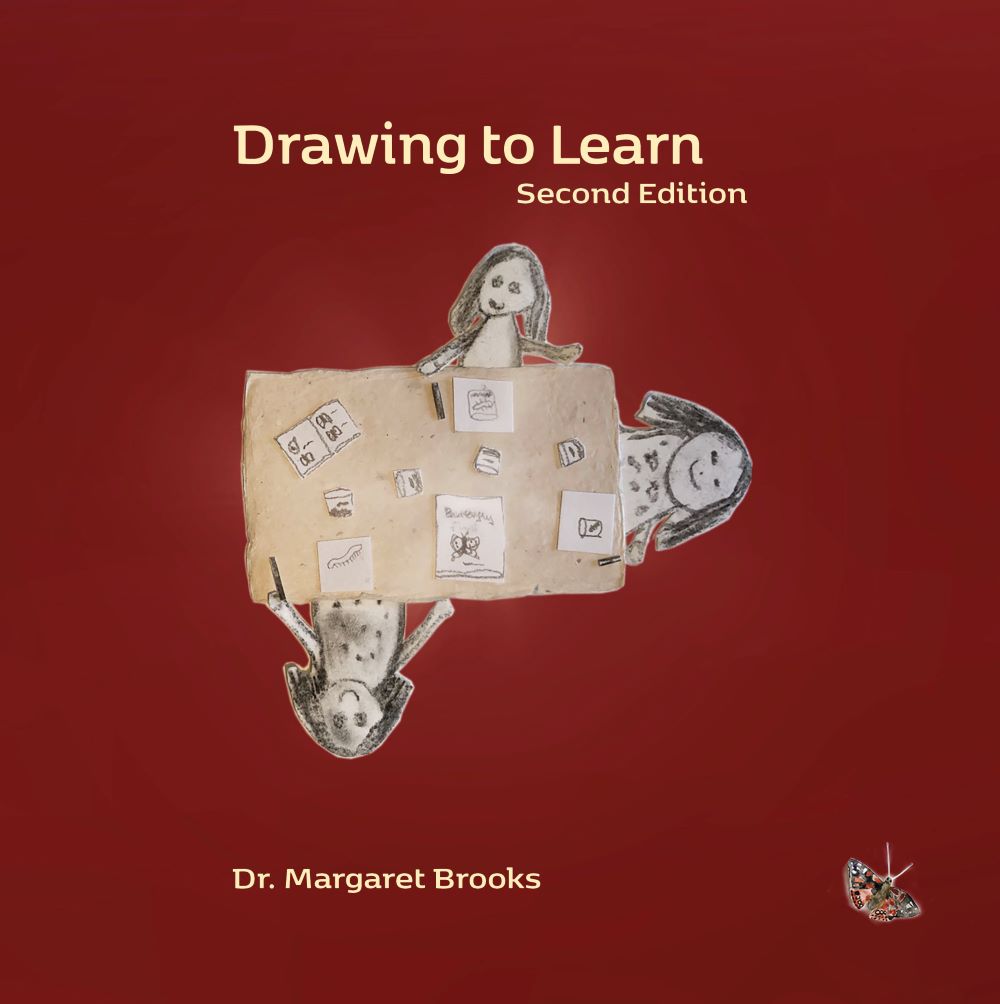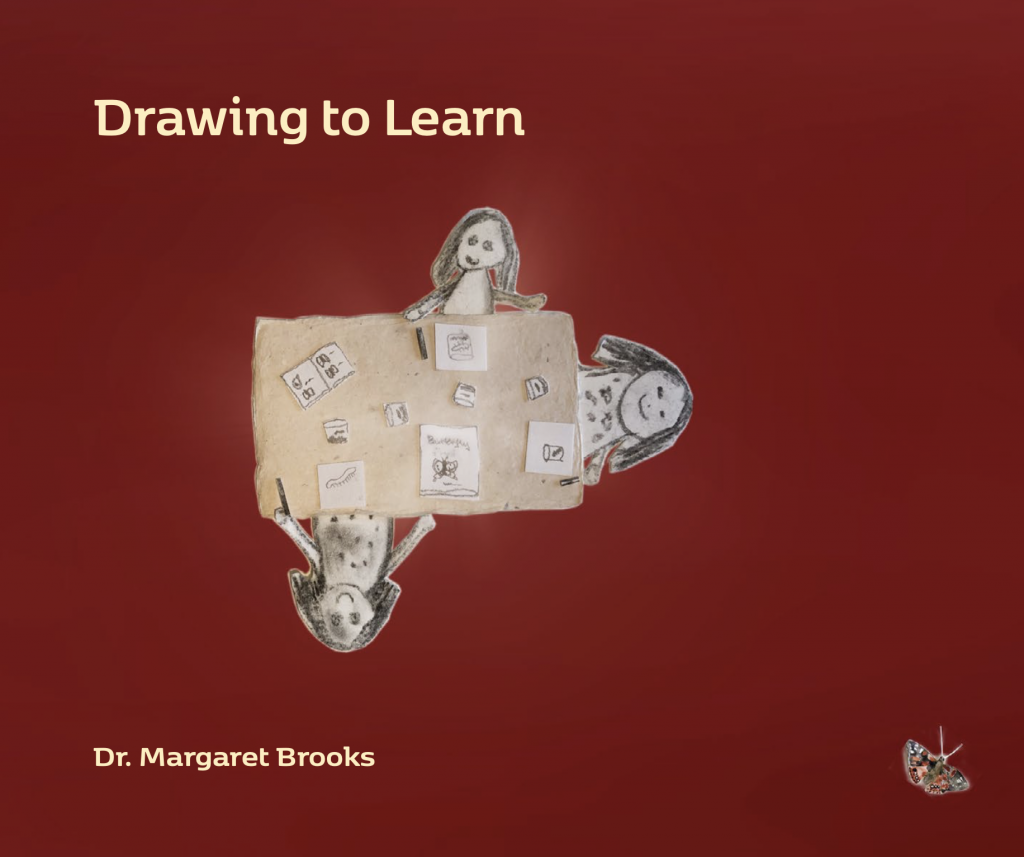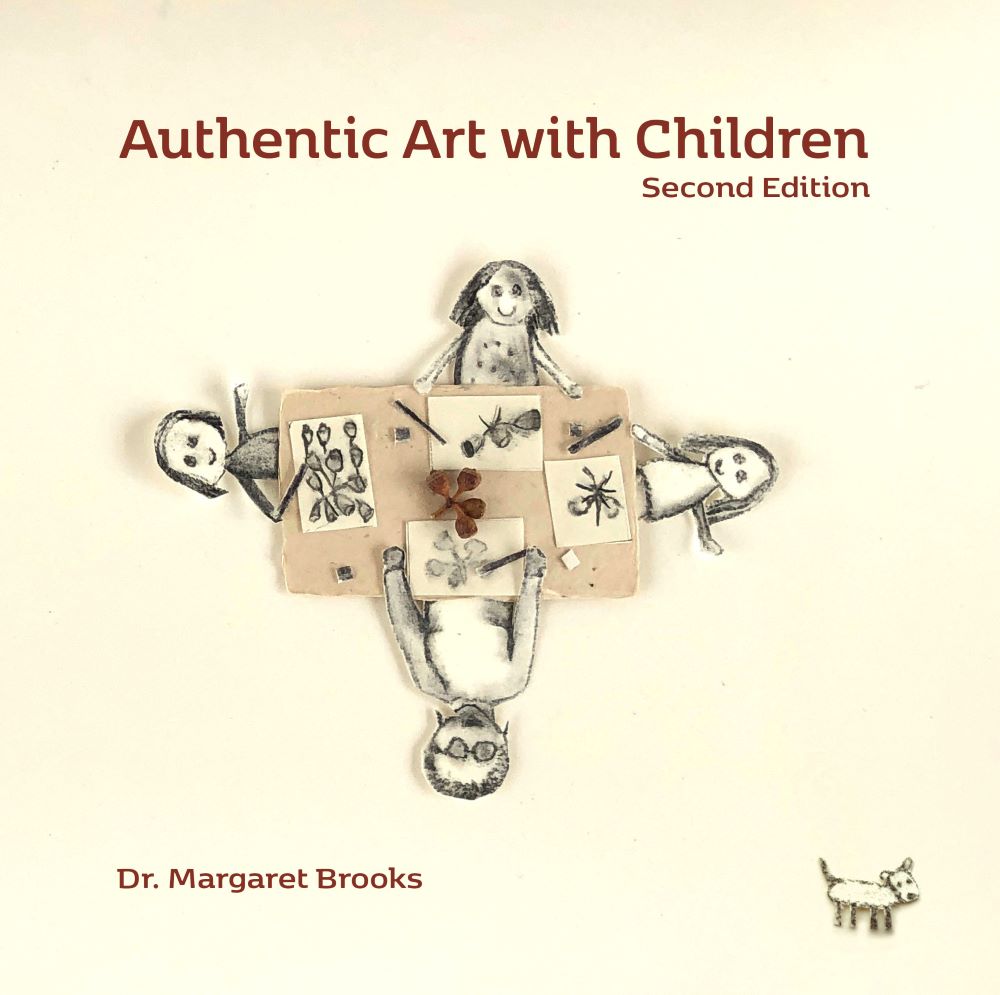Publications
Books by Dr. Margaret Brooks
Margaret has revised, updated and added to both Drawing to Learn and Authentic Art with Children. There are now QR codes in the books that take you to presentations and demonstrations. These companion books still eloquently braid together studio practices and a robust theoretical framework for the visual arts and young children. ‘Drawing to learn’ is a scholarly construction of a Vygotskian theoretical framework with lots of illustrations of theory into practice. Vygotsky and visual arts is a marriage made in heaven. ‘Authentic art with Children’ provides teachers with many examples of authentic visual art practices and lessons that will boost their confidence. These two books present a new way of thinking about the visual arts as a leading activity in development such that it is lifted to the forefront of curriculum.
Go to section:
Drawing to Learn
‘Drawing to Learn supports teachers to move beyond the restrictive age and stage development categories to theoretically ground, and inform their arts integrated pedagogy and practice. Brooks takes inspiration from Vygotsky’s socio, cultural theories to weave together a theoretically informed justification for children’s art making with equally important discussion about how teachers can empower and evaluate arts processes in their own contexts. Through storytelling and documentation of her own extensive work with children and teachers, Margaret brings Vygotskian concepts to life to clearly illustrate why children make art and it is so important that adults effectively support children’s visual art making processes.‘ – Dr Gai Lindsay
Table of contents
Chapter 1
- Why do children make art?
- Reading young children’s representations
- The state of art education
- Teacher training
Chapter 2
- Looking back and looking forward
- Vygotsky and Piaget
- Towards a more constructionist framework
Chapter 3
- The social construction of knowledge: watching butterflies
- At a practical level. At a theoretical level.
Chapter 4
- Thought, drawing and meaning.
- Spontaneous concepts, scientific concepts.
- Higher mental functions: collaborating and communicating.
- Drawing shadows.
- Implications for teaching and learning.
Chapter 5
- The consequential progression of ideas.
- Light traps.
- Implications for programming, planning and teaching.
Chapter 6
- Drawing as a leading activity in development.
- Theoretical responses to ZPD.
Chapter 7
- Imagination and creativity.
- A project about sunflowers.
Chapter 1
- Why do children make art?
- Reading young children’s representations
- The state of art education
- Teacher training
Chapter 2
- Looking back and looking forward
- Vygotsky and Piaget
- Towards a more constructionist framework
Chapter 3
- The social construction of knowledge: watching butterflies
- At a practical level. At a theoretical level.
Chapter 4
- Thought, drawing and meaning.
- Spontaneous concepts, scientific concepts.
- Higher mental functions: collaborating and communicating.
- Drawing shadows.
- Implications for teaching and learning.
Chapter 5
- The consequential progression of ideas.
- Light traps.
- Implications for programming, planning and teaching.
Chapter 6
- Drawing as a leading activity in development.
- Theoretical responses to ZPD.
Chapter 7
- Imagination and creativity.
- A project about sunflowers.
Authentic Art with Children
‘This elegant and practical book by Margaret Brooks draws upon her years of experience and practice as an artist and early childhood academic. It offers early childhood professionals clear and illustrated guidance to enhance their visual arts knowledge and build their confidence to engage in meaningful visual arts learning alongside children. A braided manifesto, aligned with examples from Margaret’s work and research alongside children, twists threads of theory, studio practice and quality curriculum strands to provide educators with tools for reflection about the elements of authentic, quality visual arts play and pedagogy in their own early childhood contexts.’ – Dr Gai Lindsay
Table of contents
Chapter 1
- Drawing – Try on being artist: Drawing with graphite
- Drawing from observation
- Thistle: An Encounter with contemporary art practice
- Working with metaphors
- Contemporary art practices
Chapter 2
- Integrating the visual arts: a project about faces
Chapter 3
- Authentic media: Clay with young children
Chapter 4
- Mark making
Chapter 5
- Putting it all together
- Charcoal
- Manifesto of pedagogical practices
Roadmaps, Treasures, Watermarks
This beautiful book, with more than six hundred images and illustrations, celebrates the pedagogical practices of Ringpung Demonstration Preschool at Paro College of Education, Bhutan. It provides exemplars of programming and planning for three- to five-year-old preschool children. It demonstrates how the arts can be threaded through the curriculum. When we focus on the arts and things like self-regulation, confidence, creativity, perseverance, empathy, and compassion, then children are gaining the attributes for a successful and fulfilling life. When young children learn to be self-motivated investigators and can discuss and represent the world in which they live, they develop a love and disposition for learning.
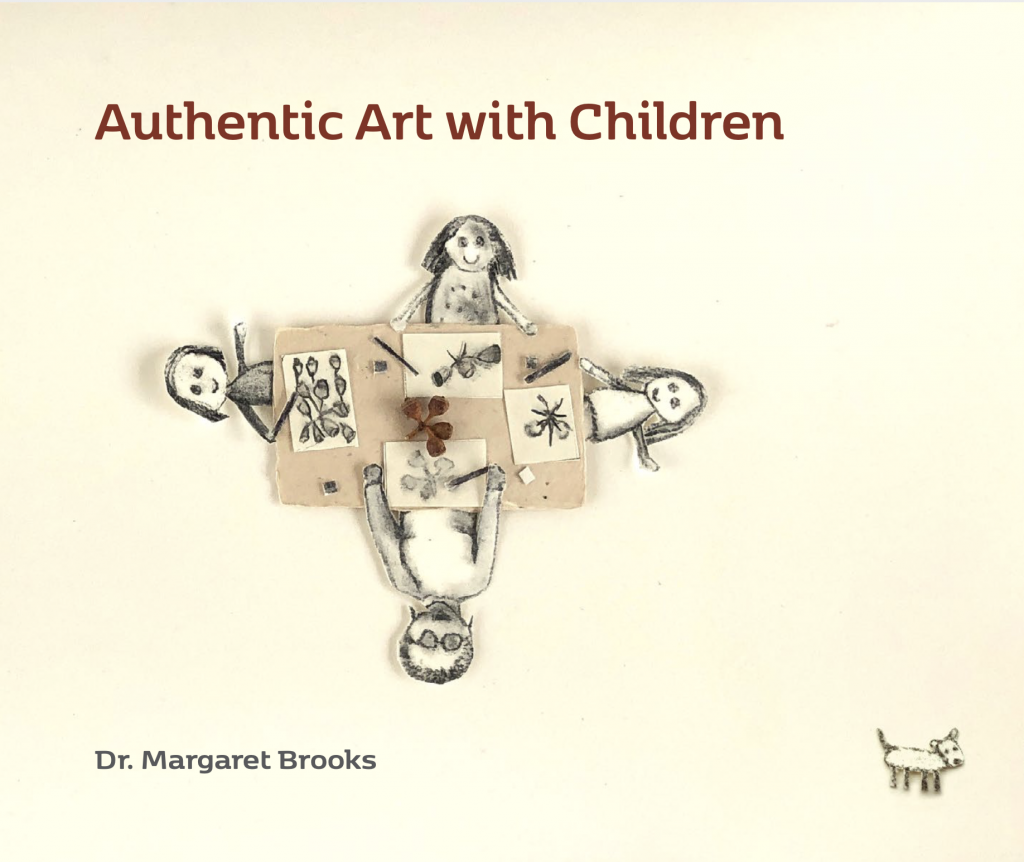
Book: Authentic Art with Children
Table of contents
Chapter 1
- Drawing – Try on being artist: Drawing with graphite
- Drawing from observation
- Thistle: An Encounter with contemporary art practice
- Working with metaphors
- Contemporary art practices
Chapter 2
- Integrating the visual arts: a project about faces
Chapter 3
- Authentic media: Clay with young children
Chapter 4
- Mark making
Chapter 5
- Putting it all together
- Charcoal
- Manifesto of pedagogical practices
Reviews
Laureate Professor Marilyn Fleer, PhD.
Australian Research Council Kathleen Fitzpatrick Laureate Fellow
I really love this suite of books. Just what is needed in the field, and in teacher education courses. I think there is a HUGE market for both.
The first book, ‘Authentic Art with Children’, showcases a broad range of Art techniques is beautiful, and so inspiring. But importantly, this publication gives teachers and educators in universities resources for the development of their skill sets – makes the Art concepts SO visible. I particularly like how there is a continuum of skills visible, and there is no age assumption associated with them. This is so respectful, and so in line with current thinking on the cultural development of children in the Arts and more broadly in psychology.
The second publication, ‘Drawing to Learn’ is brilliant. I am well versed in the collected works of Vygotsky – and I can see that Margaret fully understands the concepts – this is a rarity, as most take short cuts and just go to one summary book of the concepts – but Margaret has captured the key concepts and has presented them in such a digestible way. This is true scholarship of the highest order. Elegantly presented but deeply theorised. I fully endorse this book. It is an absolute MUST. Should be on everyone’s book shelf.
Dr Gai Lindsay, University of Wollongong.
These elegant and practical books by Dr Margaret Brooks draw upon her years of experience and practice as an artist and early childhood academic. It offers early childhood professionals clear and illustrated guidance to enhance their visual arts knowledge and build their visual arts confidence to engage in meaningful visual arts learning alongside children.
A ‘braided’ manifesto, aligned with examples from Margaret’s work and research alongside children, twists threads of theory, studio practice and quality curriculum standards to provide educators with tools for reflection about the elements of authentic, quality visual arts play and pedagogy in their own early childhood contexts.
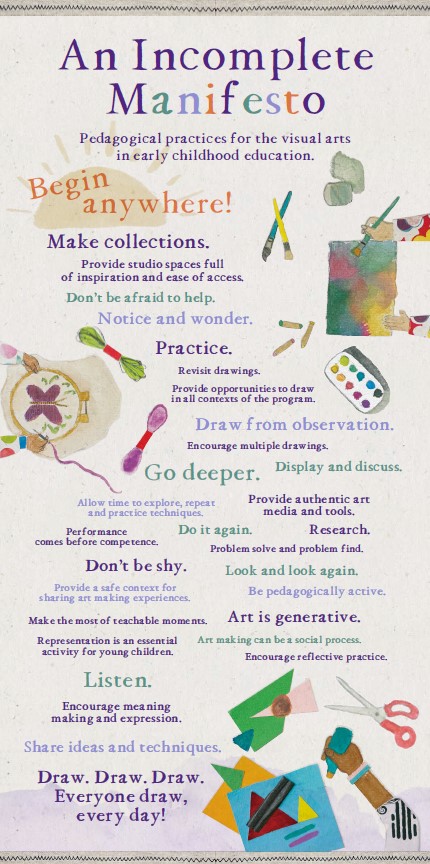
An Incomplete Manifesto
Pedagogical practices for the visual arts in early childhood education.
Click the link below to download a PDF of this poster. Print in the desired format at home or send to a commercial printer.
For more information about the International Association of Art in Early Childhood and our teaching resources, please contact us.
